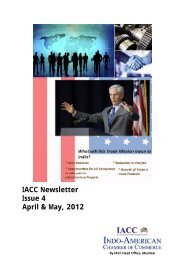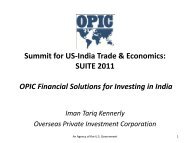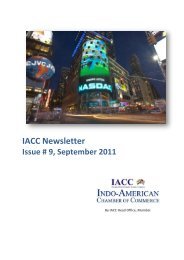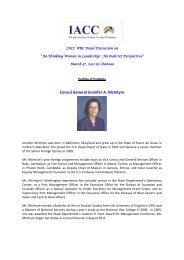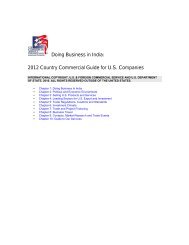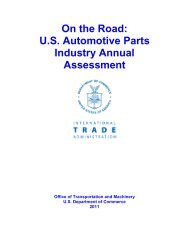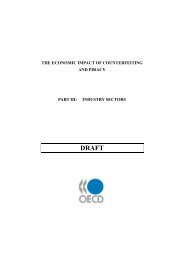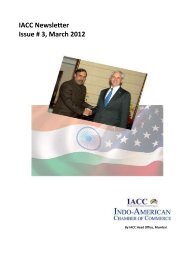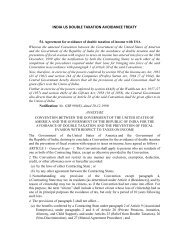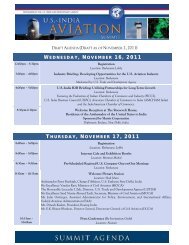Importing into the United States - Indo-American Chamber Of ...
Importing into the United States - Indo-American Chamber Of ...
Importing into the United States - Indo-American Chamber Of ...
Create successful ePaper yourself
Turn your PDF publications into a flip-book with our unique Google optimized e-Paper software.
■<br />
■<br />
■<br />
■<br />
■<br />
■<br />
Fresh fruits and vegetables for human<br />
consumption arriving from Canada or<br />
Mexico and removed from <strong>the</strong> area immediately<br />
contiguous to <strong>the</strong> border and<br />
placed within <strong>the</strong> importer’s premises<br />
within <strong>the</strong> port of importation.<br />
Shipments consigned to or for <strong>the</strong> account<br />
of any agency or officer of <strong>the</strong> U.S. government.<br />
Articles for a trade fair.<br />
Tariff-rate quota merchandise and, under<br />
certain circumstances, merchandise subject<br />
to an absolute quota. Absolute-quota items<br />
require a formal entry at all times.<br />
In very limited circumstances, merchandise<br />
released from warehouse followed<br />
within 10 working days by a warehouse<br />
withdrawal for consumption.<br />
Merchandise specifically authorized by<br />
Customs Headquarters to be entitled to<br />
release for immediate delivery.<br />
ENTRY FOR WAREHOUSE<br />
If one wishes to postpone release of <strong>the</strong><br />
goods, <strong>the</strong>y may be placed in a Customs<br />
bonded warehouse under a warehouse entry.<br />
The goods may remain in <strong>the</strong> bonded warehouse<br />
up to five years from <strong>the</strong> date of importation.<br />
At any time during that period, warehoused<br />
goods may be re-exported without<br />
paying duty, or <strong>the</strong>y may be withdrawn for<br />
consumption upon paying duty at <strong>the</strong> duty rate<br />
in effect on <strong>the</strong> date of withdrawal. If <strong>the</strong> goods<br />
are destroyed under Customs supervision, no<br />
duty is payable.<br />
While <strong>the</strong> goods are in <strong>the</strong> bonded warehouse,<br />
<strong>the</strong>y may, under Customs supervision,<br />
be manipulated by cleaning, sorting, repacking,<br />
or o<strong>the</strong>rwise changing <strong>the</strong>ir condition by<br />
processes that do not amount to manufacturing.<br />
After manipulation, and within <strong>the</strong><br />
warehousing period, <strong>the</strong> goods may be<br />
exported without <strong>the</strong> payment of duty, or <strong>the</strong>y<br />
may be withdrawn for consumption upon payment<br />
of duty at <strong>the</strong> rate applicable to <strong>the</strong> goods<br />
in <strong>the</strong>ir manipulated condition at <strong>the</strong> time of<br />
withdrawal. Perishable goods, explosive substances,<br />
or prohibited importations may not be<br />
placed in a bonded warehouse. Certain<br />
restricted articles, though not allowed release<br />
from custody, may be warehoused.<br />
Information regarding bonded manufacturing<br />
warehouses is contained in section 311<br />
of <strong>the</strong> Tariff Act (19 U.S.C. 1311).<br />
UNENTERED GOODS<br />
If no entry has been filed for <strong>the</strong> goods at<br />
<strong>the</strong> port of entry, or at <strong>the</strong> port of destination<br />
for in-bond shipments, within 15 calendar days<br />
after <strong>the</strong>ir arrival, <strong>the</strong> goods may be placed in a<br />
general-order warehouse at <strong>the</strong> importer’s risk<br />
and expense. If <strong>the</strong> goods are not entered<br />
within six months from <strong>the</strong> date of importation,<br />
<strong>the</strong>y can be sold at public auction. Perishable<br />
goods, however, and goods subject to depreciation<br />
and explosive substances may be sold<br />
sooner.<br />
Storage charges, expenses of sales, internal<br />
revenue or o<strong>the</strong>r taxes, duties, fees, and<br />
amounts for <strong>the</strong> satisfaction of liens must be<br />
taken out of <strong>the</strong> money obtained from <strong>the</strong> sale<br />
of <strong>the</strong> unentered goods. Any surplus remaining<br />
after <strong>the</strong>se deductions are taken is ordinarily<br />
payable to <strong>the</strong> holder of a duly endorsed bill of<br />
lading. This bill of lading must, however, cover<br />
those goods, and <strong>the</strong> claim must be made<br />
within 10 days of <strong>the</strong> sale. Carriers, not port<br />
directors, are required to notify a bonded warehouse<br />
of unentered merchandise. Once notified,<br />
<strong>the</strong> bonded warehouse operator/manager<br />
shall arrange for <strong>the</strong> unentered merchandise to<br />
be transported to his or her premises for<br />
storage at <strong>the</strong> consignee’s risk and expense. If<br />
<strong>the</strong> goods are subject to internal revenue taxes,<br />
but will not bring enough to pay <strong>the</strong> taxes if<br />
sold at public auction, <strong>the</strong>y are subject to<br />
destruction.<br />
MAIL ENTRIES<br />
Importers have found that in some cases it<br />
is to <strong>the</strong>ir advantage to use <strong>the</strong> national postal<br />
service — that is, a country’s mail system<br />
ra<strong>the</strong>r than courier services — to import merchandise<br />
<strong>into</strong> <strong>the</strong> <strong>United</strong> <strong>States</strong>. Some benefits<br />
to be gained are:<br />
■ Ease in clearing shipments through Customs.<br />
The duties on parcels valued at<br />
$2,000 or less are collected by <strong>the</strong> letter<br />
10 U.S. CUSTOMS SERVICE



